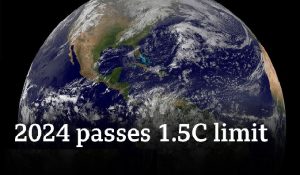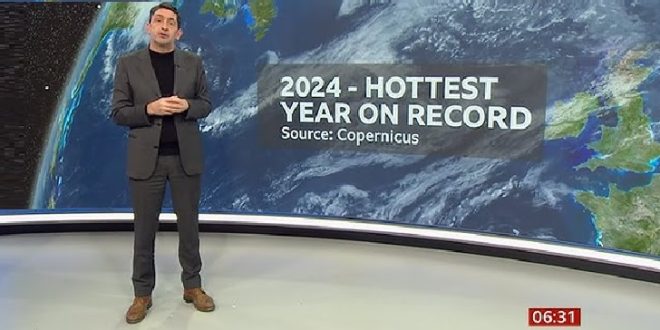12-01-2025
LONDON: The planet has moved a major step closer to warming more than 1.5C, new data shows, despite world leaders vowing a decade ago they would try to avoid this.
The European Copernicus climate service, one of the main global data providers, said on Friday that 2024 was the first calendar year to pass the symbolic threshold, as well as the world’s hottest on record.
 This does not mean the international 1.5C target has been broken, because that refers to a long-term average over decades, but does bring us nearer to doing so as fossil fuel emissions continue to heat the atmosphere.
This does not mean the international 1.5C target has been broken, because that refers to a long-term average over decades, but does bring us nearer to doing so as fossil fuel emissions continue to heat the atmosphere.
Last week UN chief Antonio Guterres described the recent run of temperature records as “climate breakdown”.
“We must exit this road to ruin and we have no time to lose,” he said in his New Year message, calling for countries to slash emissions of planet-warming gases in 2025.
Global average temperatures for 2024 were around 1.6C above those of the pre-industrial period, the time before humans started burning large amounts of fossil fuels, according to Copernicus data.
This breaks the record set in 2023 by just over 0.1C, and means the last 10 years are now the 10 warmest years on record.
The Met Office, NASA and other climate groups are due to release their own data later on Friday. All are expected to agree that 2024 was the warmest on record, although precise figures vary slightly.
Last year’s heat is predominantly due to humanity’s emissions of planet-warming gases, such as carbon dioxide, which are still at record highs.
Natural weather patterns such as El Nino where surface waters in the eastern tropical Pacific Ocean become unusually warm, played a smaller role.
“By far and away the largest contribution impacting our climate is greenhouse gas concentrations in the atmosphere,” Samantha Burgess, deputy director of Copernicus, tells media.
 Human activities are causing world temperatures to rise, posing serious threats to people and nature.
Human activities are causing world temperatures to rise, posing serious threats to people and nature.
Things are likely to worsen in the coming decades, but scientists argue urgent action can still limit the worst effects of climate change.
Climate change is the long-term shift in the Earth’s average temperatures and weather conditions.
The world has been warming up quickly over the past 100 years or so. As a result, weather patterns are changing.
Between 2015 and 2024, global temperatures were on average around 1.28C above those of the late 19th Century, according to the European Copernicus climate service, external.
Since the 1980s, each decade has been warmer than the previous one, the UK Met Office says.
The year 2024 was the world’s hottest on record, with climate change mainly responsible for the high temperatures.
It was also the first calendar year to surpass 1.5C of warming compared to pre-industrial levels, according to Copernicus.
The climate has changed naturally throughout the Earth’s history but natural causes cannot explain the particularly rapid warming seen over the last century, according to the UN’s climate body, the Intergovernmental Panel on Climate Change (IPCC).
This has been caused by human activities, in particular the widespread use of fossil fuels coal, oil and gas in homes, factories and transport systems. (Int’l Monitoring Desk)
 Pressmediaofindia
Pressmediaofindia




